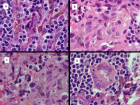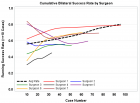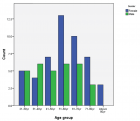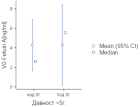Abstract
Review Article
Neurobiology of Common Sleep Disorders
Zhao Liu*, Abdullah Tolaymat and Sreenivas K Avula
Published: 14 August, 2018 | Volume 2 - Issue 2 | Pages: 039-046
Sleep disorders in human are common and detrimental to general health of all age groups. While the neurobiological mechanisms of sleep disorders are not yet fully understood, recent advances in research on the sleep-wake regulation mechanism, genetic and epigenetic factors, cognitive, emotional and physiological changes related to sleep have shed light on the mechanistic basis of sleep disorders. Over the past two decades, studies in Drosophila have yielded new insights into basic questions regarding sleep function and regulation. More recently, powerful genetic approaches in the fly have been applied toward studying primary human sleep disorders and other disorders associated with dysregulated sleep. In this review, we discussed recent advances in neurobiology of sleep-wave cycle and common sleep disorders. Understanding these mechanisms are important in the diagnosis, treatment and prevention of these common disorders.
Read Full Article HTML DOI: 10.29328/journal.jnnd.1001013 Cite this Article Read Full Article PDF
Keywords:
Sleep disorder; Insomnia; Hypersomnia; Parasomnia; Circadian Rhythms; Sleep-related movement disorders; Narcolepsy; Circadian rhythm disorder; Drosophilae; Fruit fly; Circadian gene period
References
- Jones BE. From waking to sleeping: neuronal and chemical substrates. Trends in Pharmacol Sci. 2005; 26: 578-586. Ref.: https://tinyurl.com/yc9pwoy4
- Tolaymat A, Liu Z. Sleep disorders in childhood neurological diseases. Children (Basel). 2017; 4: 84-98. Ref.: https://tinyurl.com/y9rvrpd7
- Brown RE, Basheer R, McKenna JT, Strecker RE, McCarley RW. Control of sleep and wakefulness. Physiol Rev. 2012: 92: 1087-1187. Ref.: https://tinyurl.com/yb6x7cu9
- Schwartz MD, Kliduff TS. The neurobiology of sleep and wakefulness. Psychiatr Clin North Am. 2015: 38: 615-644. Ref.: https://tinyurl.com/yd2kzpq3
- Hendricks JC, Kirk D, Pancheri K, Miller MS, Pack AI. Modafinil maintains waking in the fruit fly drosophila melanogaster. Sleep. 200; 26: 139-146. Ref.: https://tinyurl.com/yakzxkqd
- Wager-Smith K, Kay SA. Circadian rhythm genetics: From flies to mice to humans. Nature Genetics. 2000; 26: 23-27. Ref.: https://tinyurl.com/ybbao8hq
- Herber R, Hill SL, Holladay C, Biesiadecki M, Tononi G, et al. Sleep homeostasis in Drosophila melangaster. Sleep. 2004; 27: 628-639. Ref.: https://tinyurl.com/y7zaeruy
- Cirelli C. The genetic and molecular regulation of sleep: From fruit flies to humans. Nat Rev Neurosci. 2009; 10: 549-560. Ref.: https://tinyurl.com/yalawocu
- Lamberg L. Manual updates sleep disorder diagnoses. Psychiatric news. 2014.
- Roth T. Insomnia: Definition, prevalence, etiology, and consequences. J Clin Sleep Med. 2007; 3: 7-10. Ref.: https://tinyurl.com/ybmwegft
- Feige B, Al-Shajlawi A, Nisseb C, Voderholzer U, Hornyak M, et al. Does REM sleep contribute to subjective wake time in primary insomnia? A comparison of polysomnographic and subjective sleep in 100 patients. J Sleep Res. 2008; 7: 180-190. Ref.: https://tinyurl.com/y8by6557
- Wing YK, Zhang J, Lam SO, Li SX, Lai KY, et al. Familial aggregation and heritability of insomnia in a community-based study. Sleep Med. 2012; 13: 985-990. Ref.: https://tinyurl.com/yau9eqlt
- Barclay NL Eley TC, Buysse DJ, Archer SN, Gregory AM. Diurnal preference and sleep quality: same genes? A study of young adult twins. Chronobiol Int. 2010; 27: 278-296. Ref.: https://tinyurl.com/ycnvhjpc
- Josephs KA, Silber MH, Fealey RD, Nippoldt TB, Auge RG, et al. Neurophysiologic studies in Morvan syndrome. J Clin Neurophysiol. 2004; 21: 440-445. Ref.: https://tinyurl.com/y75qzz5s
- Serretti A, Benedetti F, Mandelli L, Lorenzi C, Pirovano A, et al. Genetic dissection of psychopathological symptoms: insomnia in mood disorders and CLOCK gene polymorphism. Am J Med Genet B Neuropsychiatr Genet, 2003; 121: 35-38. Ref.: https://tinyurl.com/yanatexl
- Buhr A, Bianchi MT, Baur R, Courtet P, Pignay V, et al. Functional characterization of the new human GABA(A) receptor mutation beta3(R192H). Hum Genet. 2002; 111: 154-160. Ref.: https://tinyurl.com/yauwaq5q
- Deuschle M, Schredl M, Schilling C, Wust S, Frank J, et al. Association between a serotonin transporter length polymorphism and primary insomnia. Sleep. 2010; 33: 343-347. Ref.: https://tinyurl.com/yaq6ytnc
- Barclay NL, Gregory AM. Quantitative genetic research on sleep: a review of normal sleep, sleep disturbances and associated emotional, behavioral and health-related difficulties. Sleep Med Rev. 2013; 17: 29-40. Ref.: https://tinyurl.com/y9p54kft
- Riemann D, Spiegelhalder K, Feige B, Voderholzer U, Berger M, et al. The hyperarousal model of insomnia: a review of the concept and its evidence. Sleep Med Rev. 2010; 14: 19-31. Ref.: https://tinyurl.com/y8b7nbd2
- Longstreth WT, Koepsell TD, Ton TG, Hendrickson AF, Van Bell B. The epidemiology of narcolepsy. Sleep. 2007; 30: 13-26. Ref.: https://tinyurl.com/yb94qq9m
- Khatami R, Maret S, Werth E, Retey J, Schmid D, et al. Monozygotic twins concordant for narcolepsy-cataplexy without any detectable abnormality in the hypocretin (orexin) pathway. Lancet. 2004; 363: 1199-1200. Ref.: https://tinyurl.com/ydgp3r9e
- Mignot E. Genetic and familial aspects of narcolepsy. Neurology. 1998; 50: 16-22. Ref.: https://tinyurl.com/y9vzmget
- Liu Z, Tolarmat A, Sreenivas KA. Neurobiology of narcolepsy. J Sleep Med & disorders. 2018; 5: 1093-1098.
- Konopka R, Pittendrigh C, Orr D. Reciprocal behavior associated with altered homeostasis and photosensitivity of Drosophila clock mutants. J Neurogenet. 1989; 6: 1-10. Ref.: https://tinyurl.com/yakfvdms
- Zhang Y, Ling Y, Yuan C, Dubruille R, Emery P. A role for Drosophila ATX2 in activation of PER translation and circadian behavior. Science. 2013; 340: 879-882. Ref.: https://tinyurl.com/ydz2tafk
- Chatterjee A. Hardin P. E. Time to taste: circadian clock function in the Drosophila gustatory system. Fly. 2010; 4: 283-287. Ref.: https://tinyurl.com/y9f7pzu3
- Karpowicz P, Zhang Y, Hogenesch JB, Emery P, Perrimon N. The circadian clock gates the intestinal stem cell regenerative state. Cell Reports. 2013; 4: 996-1004. Ref.: https://tinyurl.com/ycv4v3k6
- Konopka RJ. Benzer S. Clock mutants of Drosophila melanogaster. Proceedings of the National Academy of Sciences of the United States of America. 1971; 68: 2112-2116. Ref.: https://tinyurl.com/ybgkrkev
- Fan JY, Agyekum B, Venkatesan Y, Hall DR, Keightley A, et al. Noncanonical FK506-binding protein BDBT binds DBT to enhance its circadian function and forms foci at night. Neuron. 2013; 80: 984-996. Ref.: https://tinyurl.com/y94vj363
- Tei H, Okamura H, Shigeyoshi Y, Fukuhara C, Ozawa R, et al. Circadian oscillation of a mammalian homologue of the Drosophila period gene. Nature. 1997; 389: 512-516. Ref.: https://tinyurl.com/yck54vy2
- Dubowy C. Sehgal A. Circadian rhythms and sleep in Drosophila melanogaster. Genetics. 2017; 205: 1373-1397. Ref.: https://tinyurl.com/yaax9ztv
- Yeh P, Walters AS, Tsuang JW. A comprehensive overview on its epidemiology, risk factors and treatment. Subst Use Misuse. 2011; 47: 9-10.
- Sehgal A. Mignot E. Genetics of sleep and sleep disorders. Cell. 2011; 146: 194-207. Ref.: https://tinyurl.com/y7guppqa
- Yang Q, Li L, Chen Q, Foldvary-Schaefer N, Ondo WG, et al. Association studies of variants in MEIS1, BTBD9, and MAP2K5/SKOR1 with restless legs syndrome in a US population. Sleep Med. 2011; 12: 800-804. Ref.: https://tinyurl.com/ycq99qdc
- Freeman A, Pranski E, Miller RD, Radmard S, Bernhard D, et al. Strong fragmentation and motor restless in Drosohilia model of Restless legs syndrome. Curr Biol, 2012; 22: 1142-1148. Ref.: https://tinyurl.com/y8tx33r5
- Michaud M, Lavigne G, Dsaulels A, Poirier G, Montplaisir J. Effects of immobility on sensory and motor symptoms of restless legs syndromee. J Mov Dis Soc. 2002; 17: 112-115. Ref.: https://tinyurl.com/ycjmzm95
- Ferre S, Quiroz C, Guitart X, Rea W, Seyedian A, et al. Pivotal role of adenosine neurotransmittion in restless legs syndrome. Front Neurosci. 2018; 8: 722-736. Ref.: https://tinyurl.com/yaep4ymv
Similar Articles
-
Neurobiology of Common Sleep DisordersZhao Liu*,Abdullah Tolaymat,Sreenivas K Avula. Neurobiology of Common Sleep Disorders. . 2018 doi: 10.29328/journal.jnnd.1001013; 2: 039-046
-
Impact of mandibular advancement device in quantitative electroencephalogram and sleep quality in mild to severe obstructive sleep apneaCuspineda-Bravo ER*,García- Menéndez M,Castro-Batista F,Barquín-García SM,Cadelo-Casado D,Rodríguez AJ,Sharkey KM. Impact of mandibular advancement device in quantitative electroencephalogram and sleep quality in mild to severe obstructive sleep apnea. . 2020 doi: 10.29328/journal.jnnd.1001041; 4: 088-098
-
Circadian temperature rhythms of the healthy and damaged brainShevelev OA*,Petrova MV,Yuriev MY,Mengistu EM. Circadian temperature rhythms of the healthy and damaged brain. . 2022 doi: 10.29328/journal.jnnd.1001065; 6: 032-033
Recently Viewed
-
Success, Survival and Prognostic Factors in Implant Prosthesis: Experimental StudyEpifania Ettore*, Pietrantonio Maria, Christian Nunziata, Ausiello Pietro. Success, Survival and Prognostic Factors in Implant Prosthesis: Experimental Study. J Oral Health Craniofac Sci. 2023: doi: 10.29328/journal.johcs.1001045; 8: 024-028
-
Agriculture High-Quality Development and NutritionZhongsheng Guo*. Agriculture High-Quality Development and Nutrition. Arch Food Nutr Sci. 2024: doi: 10.29328/journal.afns.1001060; 8: 038-040
-
A Low-cost High-throughput Targeted Sequencing for the Accurate Detection of Respiratory Tract PathogenChangyan Ju, Chengbosen Zhou, Zhezhi Deng, Jingwei Gao, Weizhao Jiang, Hanbing Zeng, Haiwei Huang, Yongxiang Duan, David X Deng*. A Low-cost High-throughput Targeted Sequencing for the Accurate Detection of Respiratory Tract Pathogen. Int J Clin Virol. 2024: doi: 10.29328/journal.ijcv.1001056; 8: 001-007
-
A Comparative Study of Metoprolol and Amlodipine on Mortality, Disability and Complication in Acute StrokeJayantee Kalita*,Dhiraj Kumar,Nagendra B Gutti,Sandeep K Gupta,Anadi Mishra,Vivek Singh. A Comparative Study of Metoprolol and Amlodipine on Mortality, Disability and Complication in Acute Stroke. J Neurosci Neurol Disord. 2025: doi: 10.29328/journal.jnnd.1001108; 9: 039-045
-
Development of qualitative GC MS method for simultaneous identification of PM-CCM a modified illicit drugs preparation and its modern-day application in drug-facilitated crimesBhagat Singh*,Satish R Nailkar,Chetansen A Bhadkambekar,Suneel Prajapati,Sukhminder Kaur. Development of qualitative GC MS method for simultaneous identification of PM-CCM a modified illicit drugs preparation and its modern-day application in drug-facilitated crimes. J Forensic Sci Res. 2023: doi: 10.29328/journal.jfsr.1001043; 7: 004-010
Most Viewed
-
Evaluation of Biostimulants Based on Recovered Protein Hydrolysates from Animal By-products as Plant Growth EnhancersH Pérez-Aguilar*, M Lacruz-Asaro, F Arán-Ais. Evaluation of Biostimulants Based on Recovered Protein Hydrolysates from Animal By-products as Plant Growth Enhancers. J Plant Sci Phytopathol. 2023 doi: 10.29328/journal.jpsp.1001104; 7: 042-047
-
Sinonasal Myxoma Extending into the Orbit in a 4-Year Old: A Case PresentationJulian A Purrinos*, Ramzi Younis. Sinonasal Myxoma Extending into the Orbit in a 4-Year Old: A Case Presentation. Arch Case Rep. 2024 doi: 10.29328/journal.acr.1001099; 8: 075-077
-
Feasibility study of magnetic sensing for detecting single-neuron action potentialsDenis Tonini,Kai Wu,Renata Saha,Jian-Ping Wang*. Feasibility study of magnetic sensing for detecting single-neuron action potentials. Ann Biomed Sci Eng. 2022 doi: 10.29328/journal.abse.1001018; 6: 019-029
-
Pediatric Dysgerminoma: Unveiling a Rare Ovarian TumorFaten Limaiem*, Khalil Saffar, Ahmed Halouani. Pediatric Dysgerminoma: Unveiling a Rare Ovarian Tumor. Arch Case Rep. 2024 doi: 10.29328/journal.acr.1001087; 8: 010-013
-
Physical activity can change the physiological and psychological circumstances during COVID-19 pandemic: A narrative reviewKhashayar Maroufi*. Physical activity can change the physiological and psychological circumstances during COVID-19 pandemic: A narrative review. J Sports Med Ther. 2021 doi: 10.29328/journal.jsmt.1001051; 6: 001-007

HSPI: We're glad you're here. Please click "create a new Query" if you are a new visitor to our website and need further information from us.
If you are already a member of our network and need to keep track of any developments regarding a question you have already submitted, click "take me to my Query."



















































































































































